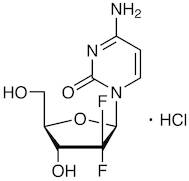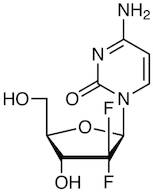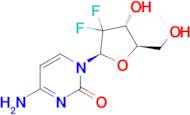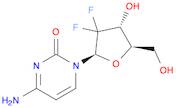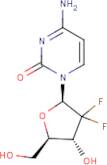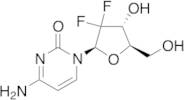
Gemcitabine Hydrochloride
Formula:
C9H11F2N3O4·HCl
Purity:
>98.0%(HPLC)(N)
Color and Shape:
White to Almost white powder to crystal
Molecular weight:
299.66
Ref: 3B-G0367
| 1g | 53.00 € | ||
| 100mg | 28.00 € |
Estimated delivery in United States, on Friday 2 Aug 2024

Gemcitabine
Formula:
C9H11F2N3O4
Purity:
>98.0%(HPLC)
Color and Shape:
White to Light yellow powder to crystal
Molecular weight:
263.20
Ref: 3B-G0544
| 1g | 64.00 € |
Estimated delivery in United States, on Friday 2 Aug 2024

Ref: 10-F317792
| 1g | 17.00 € | ||
| 5g | 54.00 € | ||
| 10g | 91.00 € | ||
| 25g | 183.00 € |
Estimated delivery in United States, on Friday 2 Aug 2024

Gemcitabine
CAS:95058-81-4
Gemcitabine (LY188011) is a synthetic cytosine nucleoside derivative and an inhibitor of DNA synthesis.
Formula:
C9H11F2N3O4
Purity:
100%
Color and Shape:
Solid
Molecular weight:
263.2
Ref: TM-T0251
| 1g | 95.00 € | ||
| 1ml | 55.00 € | ||
| 50mg | 40.00 € | ||
| 100mg | 54.00 € | ||
| 200mg | 63.00 € | ||
| 500mg | 92.00 € |
Estimated delivery in United States, on Friday 9 Aug 2024

2'-Deoxy-2',2'-difluorocytidine
CAS:95058-81-4
Formula:
C9H11F2N3O4
Purity:
98%
Color and Shape:
Solid
Molecular weight:
263.1981
Ref: AN-AG0038IE
| 1g | 31.00 € | ||
| 5g | 70.00 € | ||
| 10g | 109.00 € | ||
| 25g | 186.00 € | ||
| 100g | To inquire | ||
| 250mg | 25.00 € |
Estimated delivery in United States, on Friday 9 Aug 2024

Gemcitabine-13C-15N2
Formula:
C813CH11F2N15N2O4
Color and Shape:
White To Off-White Solid
Molecular weight:
266.18
Ref: 4Z-G-2634
| 10mg | To inquire | ||
| 25mg | To inquire | ||
| 50mg | To inquire | ||
| 100mg | To inquire |
Estimated delivery in United States, on Monday 12 Aug 2024

Gemcitabine
CAS:95058-81-4
Formula:
C9H11F2N3O4
Color and Shape:
White To Off-White Solid
Molecular weight:
263.20
Ref: 4Z-G-261
| 10mg | To inquire | ||
| 25mg | To inquire | ||
| 50mg | To inquire | ||
| 100mg | To inquire |
Estimated delivery in United States, on Monday 12 Aug 2024

Gemcitabine
CAS:95058-81-4
Formula:
C9H11F2N3O4
Purity:
≥ 98.0% (dried basis)
Color and Shape:
White or off-white crystalline powder
Molecular weight:
263.20
Ref: 7W-GP9877
| 25mg | 41.00 € | ||
| 100mg | 93.00 € |
Estimated delivery in United States, on Monday 12 Aug 2024

Ref: 54-BIFK0023
| 50mg | 56.00 € | ||
| 100mg | 93.00 € | ||
| 250mg | 170.00 € |
Estimated delivery in United States, on Friday 16 Aug 2024

Gemcitabine
CAS:95058-81-4
Applications Gemcitabine is used for breast cancer treatment. First-line treatment for locally advanced pancreatic cancer. …
Formula:
C9H11F2N3O4
Color and Shape:
Off-White
Molecular weight:
263.2
Ref: TR-G305028
| 1g | 125.00 € | ||
| 100mg | 80.00 € | ||
| 250mg | 91.00 € |
Estimated delivery in United States, on Monday 19 Aug 2024

Gemcitabine base
CAS:95058-81-4
Gemcitabine is a prodrug that is converted to 5-fluorouracil (5FU) in the body. It has …
Formula:
C9H11F2N3O4
Purity:
Min. 98 Area-%
Color and Shape:
White Powder
Molecular weight:
263.2 g/mol
Ref: 3D-ND04237
| 2g | 118.00 € | ||
| 5g | 199.00 € | ||
| 10g | 326.00 € | ||
| 25g | 608.00 € | ||
| 50g | 927.00 € |
Estimated delivery in United States, on Tuesday 20 Aug 2024












